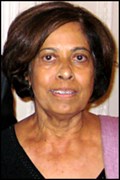
As we celebrate Kamala Harris’s historic election into the role of Vice President-Elect, news outlets across the country are writing about her upbringing and spotlighting her family members, including her mother Shyamala Gopalan Harris. Many of our members have seen that Shyamala Harris was a notable supporter of Breast Cancer Action and have asked about her relationship to our work.
Dr. Shyamala Harris was a supporter and donor to our organization from 2000 to 2007. In 2005 our former Executive Director Barbara Brenner wrote that what most interested Harris about our work was BCAction’s deep level of analysis. At the time, Harris had planned to become further involved with BCAction as a volunteer, and even had hopes to host a house party benefitting the organization as she started to wind down her academic work.
Unfortunately, Harris passed away from cancer in 2009. In her obituary, it was requested that donations be made to Breast Cancer Action in lieu of flowers.
It’s no surprise that our mission and our work resonated with Shyamala Harris, given that she was both a world-renowned scientist as well as a lifelong social justice advocate. As stated in her obituary “She embodied an independent, confident and curious spirit that led her to travel alone to the U.S. as a teen; forge a career as a brilliant breast cancer researcher; join the Civil Rights Movement; introduce a generation of students of color to careers in science; and, through it all, raise two remarkable young women, by herself.”
At age 19, Harris moved from Delhi, India to Berkeley, California, where she earned her PhD in nutrition and endocrinology at the young age of 25. This is also where Harris became involved in the Civil Rights Movement. She fought to take on injustice and racial discrimination, later passing the values of equality and justice onto her daughters, Kamala and Maya Harris.
Shyamala’s early career was centered around breast cancer research, which took her to universities throughout the world. Her seminal work in isolating and characterizing the progesterone receptor gene transformed the medical establishment’s understanding of the hormone-responsiveness of breast tissue. Her discovery sparked many advances regarding the role of progesterone and its cellular receptor in breast biology and cancer. Her later career was spent as an educator, where she mentored dozens of students, many who were students of color or the first in their families to pursue careers in science.
Her groundbreaking work forever changed the scientific community’s knowledge on how hormones pertain to breast cancer. In 2009 we wrote “The world of women affected by breast cancer changed for the better because of Harris’s presence in it,” and that is certainly still true today.
Want to get involved in Breast Cancer Action’s work? Learn about our take on breast cancer or sign-up for our email list below.